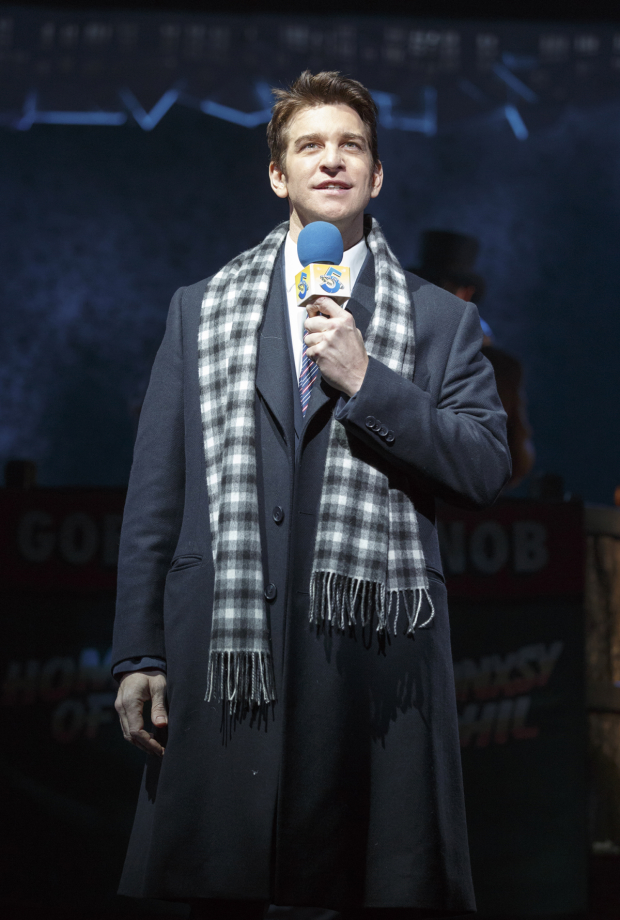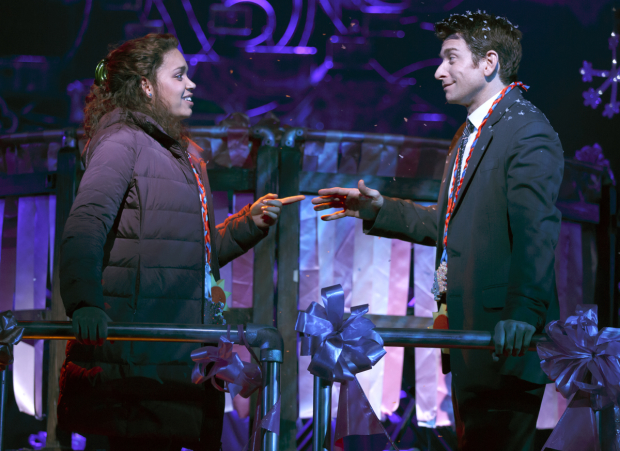Groundhog Day

(© Joan Marcus)
For several years, when Stephen Sondheim was asked what his ideal next musical would be, the answer was a stage adaptation of Groundhog Day, Danny Rubin and Harold Ramis' 1993 movie masterpiece about a cynical weatherman forced to repeat the same day over and over. Despite his belief that the material was ripe for musicalization, Sondheim eventually gave up the project. Any attempt to improve on the film would, in his words, "gild the lily."
The knowledge that this adaptation proved too hard for one of Broadway's greatest songwriters didn't deter Tim Minchin, the Australian composer and lyricist behind Matilda The Musical. Teaming up with Rubin, he was able to shepherd Groundhog Day to the stage. Their creation, directed by Minchin's Matilda collaborator Matthew Warchus and featuring the same creative team, premiered last year at London's Old Vic and won the Olivier Award for Best New Musical earlier this month. It doesn't "gild the lily" but instead provides a visual feast, is musically fascinating, and features a truly epic performance from leading man Andy Karl.
Karl plays Phil Connors, a popular television weather forecaster with a reputation for being a callous a**hole. On February 2, the arrogant Phil finds himself on assignment in Punxsutawney, Pennsylvania, where he must cover the annual Groundhog Day festivities. Of course, a blizzard that Phil didn't predict would hit the area does, trapping him and his producer, Rita Hanson (Barrett Doss), in this small hick burg overnight at the same kitschy bed-and-breakfast he's so desperate to escape. The next morning, he wakes up…and it's Groundhog Day again. And he's the only one who realizes it.
One of the aspects that made the movie Groundhog Day so captivating was the fact that Rubin and Ramis never explain how Phil got caught in the time warp that causes this one particular day to repeat itself, nor do they ever reveal how long he was stuck. Happily, Rubin doesn't add a Groundhog Day mythology to his stage version, but as in the movie, viewers do eventually learn that to get unstuck, Phil has to become a nice guy. And for someone who's as much of a jerk as he is, that takes a long, long time.
During a 2009 interview, the now-deceased Ramis suggested that for Groundhog Day to work as a musical, it would just need to feature "one song all the way through." To a degree, that's what Minchin did, times four. The entire first hour of his musical is a jazz-like theme and variation on the same four songs: the opening number "There Will Be Sun," Phil's I-want-(to-get-out-of-here) tune "Small Town, USA," a radio jingle playing each morning on Phil's alarm clock (replacing Sonny and Cher's "I Got You Babe" from the film), and a reprise of "There Will Be Sun." It's pretty ingenious and, combined with Rubin's book, never once feels circular.
Yet the show itself loses steam when it becomes a more conventional piece. Rubin and Minchin make some crucial missteps, like giving big songs to ancillary characters (played by John Sanders as Ned Ryerson and Rebecca Faulkenberry as Nancy) who heretofore had no particular development and disappear thereafter. It's in Faulkenberry's big number, the beautiful but oddly placed second-act opener "Playing Nancy," in which we realize that the show has a woman problem too, in that women only exist in this universe as sex objects (this wistful ballad aims to show how Nancy, the local "perky-breasted, giggly one-night stand," is stuck in as much of a repetitive rut as Phil, though she still sings that "it's better to be leered at than not desired at all.") The same is true of Rita, whose function in much of the first act is to turn down Phil's predatory advances over and over until he knows better.
To Karl's credit, he does a great job of playing a jerk in a completely different way than Bill Murray indelibly did on-screen. We don't want to sympathize with him, but Karl has such a twinkle that it's impossible not to. Only rarely leaving the stage, he creates a trajectory that gets us on his side from the get-go but never allows us to ignore the darker, weirder impulses of the character. While the rest of the company is quite good — Doss, in particular, adds spunk to a role that has slightly more depth than its on-screen counterpart — it's Karl's heroic performance, complete with deliciously inventive sight gags and outrageous stunts (one of which, a leapfrog jump in Peter Darling and Ellen Kane's choreography, got him injured during a recent performance), that truly carries the piece.
Overall, Groundhog Day is one of the more imaginative musicals of the season. When the material is combined with Warchus' cinematic staging (on an eye-popping but frequently malfunctioning five-turntable set by Rob Howell), it is also one of the most consistently thrilling and even includes an exciting car chase. It's exactly what you want a Broadway musical to be: a high-concept spectacle but one that has a compelling story, hummable music, and smart-as-hell lyrics. Reliving Groundhog Day over and over would prove to be a real pleasure.

(© Joan Marcus)











